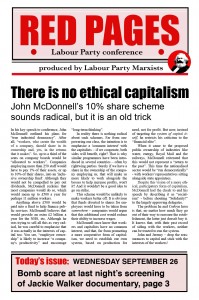 Red Pages, Wednesday September 26 – download the PDF here
Red Pages, Wednesday September 26 – download the PDF here
In today’s issue:
There is no ethical capitalism
John McDonnell’s 10% share scheme sounds radical, but it is an old trick
Bomb hoax at Jackie Walker film
Right wing damp squib
The Jewish Labour Movement and other right wingers kept their heads down – some thugs did their dirty work
No Momentum
Conference proved that it is time for Jon Lansman to step aside
There is no ethical capitalism
John McDonnell’s 10% share scheme sounds radical, but it is an old trick
In his key speech to conference, John McDonnell outlined his plans for “true industrial democracy”. After all, “workers, who create the wealth of a company, should share in its ownership and, yes, in the returns that it makes”. So, up to a third of the seats on company boards would be “allocated to workers”. Companies employing more than 250 staff would have to pay 1% of their assets, or up to 10% of their shares, into an ‘inclu- sive ownership fund’. Although they would not be compelled to pay out dividends, McDonnell reckons that most companies would do so, which would mean up to £500 a year for perhaps 11 million workers.
Anything above £500 would be paid into a fund to help finance pub- lic services. McDonnell believes that would provide an extra £2 billion a year for the NHS, etc. Although he was trying to sell all this as very radical, he was careful to emphasise that it was actually in the interests of capital too. You see, “employee owner- ship” is likely to increase “a company’s productivity” and encourage “long-term thinking”.
In reality there is nothing radical about such schemes. Far from em- powering our class, the intention is to emphasise a ‘common interest’ with the capitalists – if we cooperate, both sides will benefit, right? That is why similar programmes have been introduced in several countries – often by rightwing parties. Surely if we have a share in the ownership of the company employing us, that will make us more likely to work alongside the bosses to help increase profits, won’t it? And it wouldn’t be a good idea to go on strike.
This scheme would be unlikely to make workers better off. It is obvious that funds diverted to shares for em- ployees would have to be taken from somewhere – companies would argue that this additional cost would reduce their ability to increase wages.
McDonnell once knew that workers and capitalists have no common interest, and that, far from promoting a more cooperative form of capitalism, we need to establish our own system, based on production for need, not for profit. But now, instead of targeting the system of capital itself, he restricts his criticism to the “financial elite”.
When it came to the proposed public ownership of industries like water, energy, Royal Mail and the railways, McDonnell reiterated that this would not represent a “return to the past”. This time the nationalised sector would be “run democratically” – with workers’ representatives sitting alongside state appointees.
Despite this vision of a more ethical, participatory form of capitalism, McDonnell had the cheek to end his speech by describing it as “socialism” – before shouting “Solidarity!” to the largely approving delegates.
The problem he and Corbyn have is that, no matter how much they go out of their way to reassure the estab- lishment, the latter just doesn’t buy it. It knows that, with their past record of siding with the workers, neither can be trusted to run the system.
John and Jeremy – drop the reassurances to capital and stick with the interests of the workers!
Right wing damp squib
The Jewish Labour Movement and other right wingers kept their heads down – some thugs did their dirty work
In the run-up to conference there were reports that rightwingers were planning to “force conference dele- gates to ‘run the gauntlet’ of a placard-waving demonstration that will claim to be about anti-Semitism”; that “disruption was planned at any fringe event that Corbyn is expected to attend”, and that “any appearances by Unite general secretary Len McCluskey, Labour general secretary Jennie Formby or Chris Williamson are on the hit list”. There were also rumours of some sort of anti-Corbyn demonstration along the lines of the ‘Enough is enough’ outing on March 26. Various leftwing ‘rapid response teams’ had started to organise in or- der to mobilise for a quick counter-demonstration.
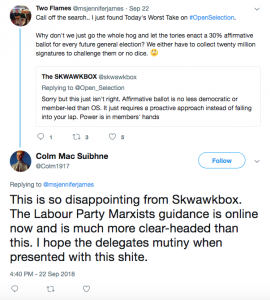 In the end, none of it happened. Supporters of the pro-Zionist Jewish Labour Movement and other rightwingers kept to themselves and made no attempt to engage delegates and visitors. We also received markedly less abuse this year compared to the 2017 conference in Brighton. Last year, our Labour Party Marxists front-page article – ‘Anti- Zionism does not equal anti-Semitism’, written by Israeli socialist Moshé Machover – led to huge uproar. Assorted rightwingers and supporters of the JLM gathered aggressively around our stall, snatched copies of LPM and tried to provoke our distributors. It was all pretty small-scale and pathetic, but the right was in an aggressive and offensive mood.
In the end, none of it happened. Supporters of the pro-Zionist Jewish Labour Movement and other rightwingers kept to themselves and made no attempt to engage delegates and visitors. We also received markedly less abuse this year compared to the 2017 conference in Brighton. Last year, our Labour Party Marxists front-page article – ‘Anti- Zionism does not equal anti-Semitism’, written by Israeli socialist Moshé Machover – led to huge uproar. Assorted rightwingers and supporters of the JLM gathered aggressively around our stall, snatched copies of LPM and tried to provoke our distributors. It was all pretty small-scale and pathetic, but the right was in an aggressive and offensive mood.
It got worse: John Mann MP and the JLM complained to Labour’s compliance unit. It led to the suspension and then expulsion of comrade Machover over his links with LPM. After a huge international outcry and a pointed lawyer’s letter to the Labour Party, Iain McNicol relented and reinstated comrade Machover within a month.
But that was 2017. This year, the response has been far more mooted.
Again, our excellent front-page article was written by comrade Machover. Its headline is intentionally provocative: ‘Why Israel is a racist state’. This refers, of course, to the NEC’s ill-judged adoption of the full ‘working definition’ of anti-Semitism published by the International Holocaust Remembrance Alliance (IHRA), including all 11 disputed examples – which includes a ban on describing Israel as racist. Clearly, comrade Machover’s article is perti- nent and we were not surprised that many delegates and visitors were attracted by the headline. We handed out over 2,000 copies of LPM, in addition to the 1,300 daily copies of our Red Pages. Reactions were 95% favourable, with many thanking us, and some commenting along the lines of: ‘At long last, somebody is giving some political guidance!’ Even Labour First’s Luke Akehurst could not help admitting that he was “very impressed” by our daily output (he seems to have been the only one handing out his A4 Labour First leaflet).
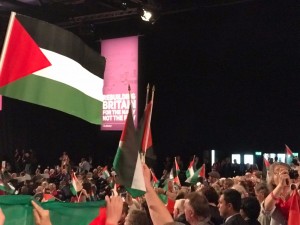 We got a few quietly huffed comments along the lines of ‘Don’t you know that’s anti-Semitic?’ But that’s about it. While the right has been incredibly successful with their smear campaign in the mainstream media, that kind of bubble bursts pretty quickly once you come to con- ference. Party delegates are usually among the most active Labour members – they know from first-hand experience that the party is not riddled with anti-Semites. It seemed as though every other delegate or conference visitor had swapped their official lanyard (featuring the logo of the rightwing Usdaw union) with that handed out by the Palestine Solidarity Campaign.
We got a few quietly huffed comments along the lines of ‘Don’t you know that’s anti-Semitic?’ But that’s about it. While the right has been incredibly successful with their smear campaign in the mainstream media, that kind of bubble bursts pretty quickly once you come to con- ference. Party delegates are usually among the most active Labour members – they know from first-hand experience that the party is not riddled with anti-Semites. It seemed as though every other delegate or conference visitor had swapped their official lanyard (featuring the logo of the rightwing Usdaw union) with that handed out by the Palestine Solidarity Campaign.
Yesterday, hundreds of delegates waved Palestinian flags (which had been distributed by the PSC and Labour Against the Witchhunt) when a composite motion on Palestine was debated and, like last year, every reference to Palestine was greeted with huge applause.
No wonder then that rightwingers are not exactly keen to openly show their face at conference any more. We can just about imagine the reception they would have got if they had tried to hold up ‘Corbyn is an anti- Semite’ posters.
However, we hear of two instances where small groups of Zionist thugs from ‘Jewish Human Rights Watch’, armed with video cameras, followed Jewish pro-Palestine campaigner Jenny Manson and Unite general secretary Len McCluskey after fringe meetings, trying to threaten and provoke them. The bomb scare at the screening of the Jackie Walker documentary certainly falls into that category (see below).
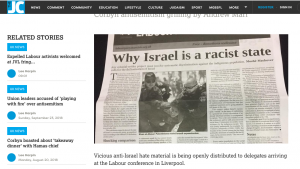 Clearly, the civil war is far from over and the smear campaign in the media continues unabated. For example, the right has been busy fingering comrade Machover and LPM: The Jewish Chronicle shouts that we were distributing “vicious anti-Israel hate material, Breitbart calls it an “inflammatory article”, while The Times of Israel complains, wrongly, that comrade Machover was “comparing Israel to Nazis”.
Clearly, the civil war is far from over and the smear campaign in the media continues unabated. For example, the right has been busy fingering comrade Machover and LPM: The Jewish Chronicle shouts that we were distributing “vicious anti-Israel hate material, Breitbart calls it an “inflammatory article”, while The Times of Israel complains, wrongly, that comrade Machover was “comparing Israel to Nazis”.
Comrade Machover has responded in an admiringly calm manner to all this: “If you are interested in the truth, please read my article and the two attacks. You will see that the Jewish Chronicle and Times of Israel articles contain several lies and distortions, among which are the very headings of the said articles.”
We cannot rule out that comrade Machover may once again be reported to Labour’s compliance unit. We cannot rule out that he will once again be suspended. We cannot rule out further expulsions of LPM supporters. Although Jeremy Corbyn publicly stated last year that he was “glad” that comrade Machover had been reinstated, a lot has happened in the last 12 months. Because of the ongoing and doomed strategy of the party leadership around Corbyn to try and conciliate and placate the right, the fake anti-Semitism campaign has gained an incredible amount of ground.
Take the conference session on Tuesday afternoon with the rather absurd title of ‘Security at home and abroad’, which included the debate on Brexit – and Palestine. This session was, incredibly, chaired by NEC member Rhea Wolfson, a member of the JLM. She started the session by warning conference to stay away from “inward-looking debate which focuses on internal matters and NEC decisions. Please be careful about the language you use. Make everybody feel welcome and do not boo.”
Wolfson was, however, less than “welcoming” when Hilary Wise from Ealing and Acton Central CLP spoke eloquently about the anti-Semitism smear campaign. She stated that as a campaigner on Palestinian rights for 30 years, she had “never seen anything like the current campaign of slurs and accusations made against Jeremy Corbyn and the left in the party. I am afraid it is an orchestrated campaign and if you want to know how it works I urge you to watch ‘The Lobby’ on Al Jazeera.”
At that point Wolfson warned her: “I would ask you to be very careful. You are straying into territory here.”
Comrade Wise went on to warn quite rightly that “this campaign will only get worse and the list of people being denounced as anti-Semitic will get longer, often simply for being proponents of Palestinian rights.” Wolfson interrupted her again: “I urge you to be careful” and then went straight on to tell her abruptly: “Take your seat – your time is up now.”
After two minutes and 45 seconds, that is. All other delegates got a minimum of three minutes, with Wolfson gently requesting that they finish when their time was up. But Wolfson is not just a member of the JLM: she used her vote on the NEC to send Jackie Walker to the national constitutional committee, pushed through the IHRA definition and has ambitions to become an MP. She will fit in well with the current PLP. Her fellow travellers in the Alliance for Workers’ Liberty must be so proud (she is an editor of their magazine The Clarion).
Thornberry
In this context, the speech by Emily Thornberry, groomed by ‘moderates’ to take over from Jeremy Corbyn, was interesting. She clearly had been picked to speak in favour of the anti-Semitism witch-hunt – the only person at conference to do so. “There are sickening individuals on the fringes of our movement, who use our legitimate support for Palestine as a cloak and a cover for their despicable hatred of Jewish people, and their desire to see Israel destroyed. These people stand for everything that we have always stood against and they must be kicked out of our party, the same way Oswald Mosley was kicked out of Liverpool.” Her dramatic shouts of “No pasaran, no pasaran!” tricked some people into giving her a standing ovation.
Needless to say, Rhea Wolfson made no attempt to reign in Thornberry for these crass insults, no doubt directed at comrades like Jackie Walker, who is about to be thrown out of the party. Thornberry is a fellow Zionist, after all.
To quote Chris Williamson MP at the fringe organised by Labour Against the Witchhunt: “The only way you stop a playground bully is to stop running. The monster is getting bigger, the more you feed it. Stop feeding the beast! They are trying to pick us off, one by one. Which is why we need to call this campaign out for what it is: a pile of nonsense.”
Bomb hoax at Jackie Walker film
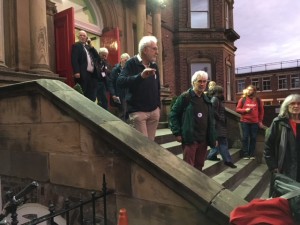 Last night’s film preview of the new documentary, ‘The political
lynching of Jackie Walker’, had to be stopped a few minutes in.
After an anonymous phone call (“there are two bombs in the
building that will kill many people”), all 150 visitors had to evacu
ate Blackburn House on police orders. Of course, no bomb was
found. By the time the police gave the all-clear, the staff wanted
to go home. This hoax is almost certainly part of the campaign
by pro-Zionist forces to disrupt and intimidate the pro-Palestinian left. But, of course, this kind of cowardly behaviour will only
increase the feeling of solidarity for Jackie Walker and all the
other victims of the witch-hunt – and interest in the film. Director Jon Pullman announced outside Blackburn House that anybody who wants to show the documentary should contact him: www.jonpullman.com.
Last night’s film preview of the new documentary, ‘The political
lynching of Jackie Walker’, had to be stopped a few minutes in.
After an anonymous phone call (“there are two bombs in the
building that will kill many people”), all 150 visitors had to evacu
ate Blackburn House on police orders. Of course, no bomb was
found. By the time the police gave the all-clear, the staff wanted
to go home. This hoax is almost certainly part of the campaign
by pro-Zionist forces to disrupt and intimidate the pro-Palestinian left. But, of course, this kind of cowardly behaviour will only
increase the feeling of solidarity for Jackie Walker and all the
other victims of the witch-hunt – and interest in the film. Director Jon Pullman announced outside Blackburn House that anybody who wants to show the documentary should contact him: www.jonpullman.com.
No Momentum
Conference proved that it is
time for Jon Lansman to go
Momentum played almost no role at conference. Of course, it organised The World Transformed across three venues, but with varied levels of success. It felt smaller than previous events and much less relevant, with most sessions having been outsourced to other organisations. While Freedom of Speech on Israel, the Liverpool 47 and Labour Against the Witchhunt were denied spaces, those allowed to organise at TWT made use of it by putting on valuable sessions like ‘Decolonising yoga’ and ‘Acid Corbynism’.
Last year, Momentum made a huge effort in advance of conference to gather data from delegates, so that they could be regularly sent text messages, carrying frequently useful voting guidelines. None of that happened this year. Momentum had published an app, but, unless you actively went looking for recommendations, you wouldn’t know how Jon Lansman (the owner of Momentum’s database) felt about the various conference motions.
Momentum also did not put forward any candidates – or voting recommendations – for positions on the conference arrangements committee or the national constitutional committee (which deals with all disciplinary matters passed on to it by the NEC).
Crucially, Lansman badly folded on the question of open selection of parliamentary candidates (also known as mandatory reselection). Moved by International Labour, this rule change would have done away with the undemocratic trigger ballot, which always favours the sitting MP, who has to be actively challenged. Open selection would have created a level playing field between all interested candidates. Clearly, a much better and far more democratic system.
Having opportunistically jumped on the open selection bandwagon about a week before conference, he let it be known during the debate on the Party Democracy Review that Momentum would now prefer that delegates voted in favour of the NEC compromise after all – ie, a reform of the trigger ballot rather than its abolition. This followed hot on the heels of Unite general secretary Len McCluskey’s intervention, who kept on insisting that he would ask his delegates to vote for mandatory reselection – if such a motion should reach conference floor. But, in the meantime, he did everything in his power to stop the motion coming before conference.
Most delegates were fuming and the NEC amendment only scraped through because of the support of the unions. Momentum was clearly not representing CLP delegates – the vast majority of whom are in support of mandatory reselection (see yesterday’s issue of Red Pages).
Momentum has proved once again how utterly useless it is when it comes to actually organising the Labour left. Things really started to disintegrate in the wake of the Lansman coup of January 10 2017, when Lansman abolished all democratic structures in Momentum and imposed his own constitution. But the whole farce over the defeat of the principle of mandatory reselection exposed really rather dramatically the huge vacuum that exists on the left of our party. We urgently need a principled, effective organisation of the Labour left that can coordinate the fight for the democratic transformation of the party and coordinate a national campaign for mandatory reselection and other important democratic demands. Momentum clearly cannot fill that role.
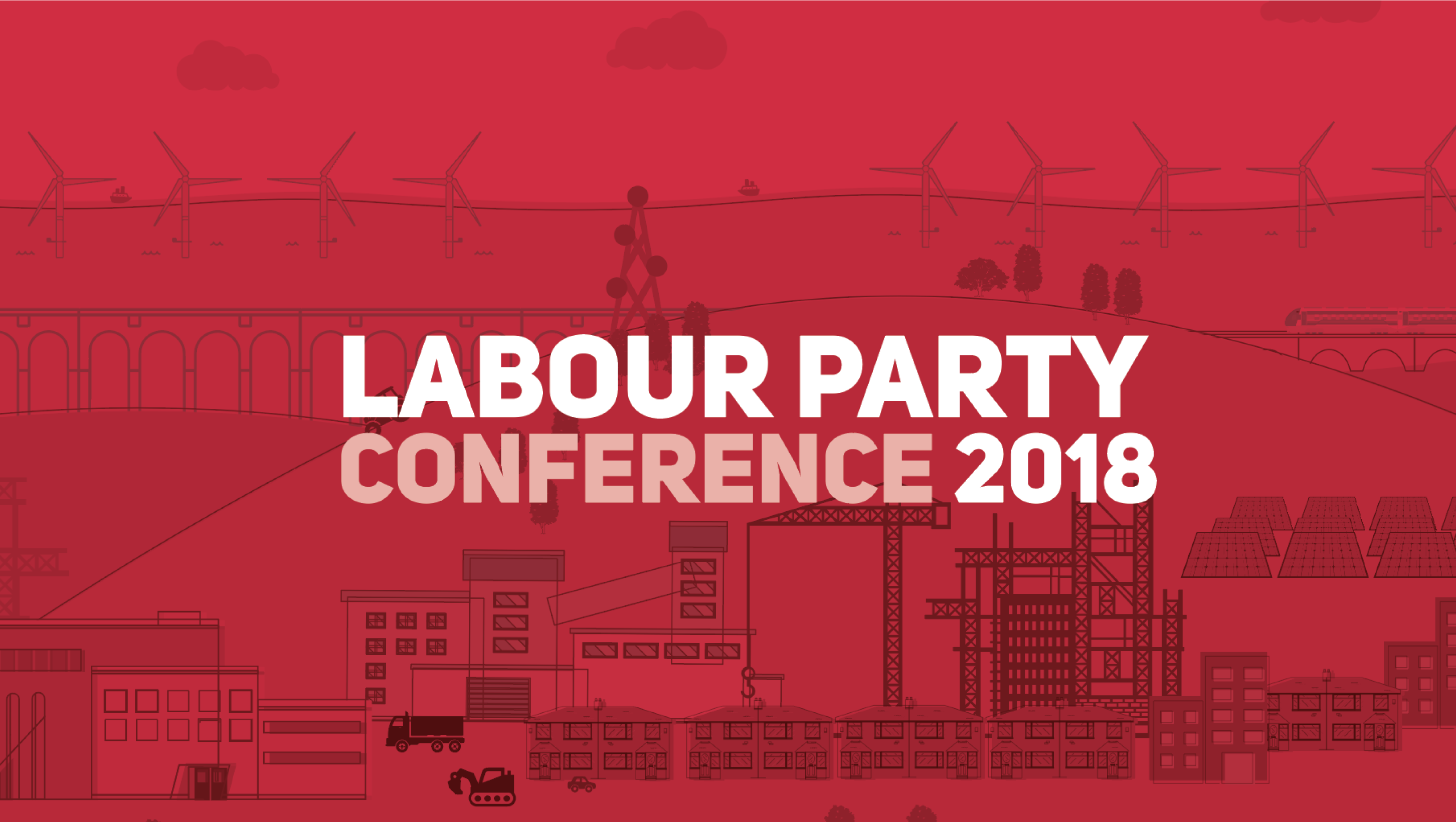

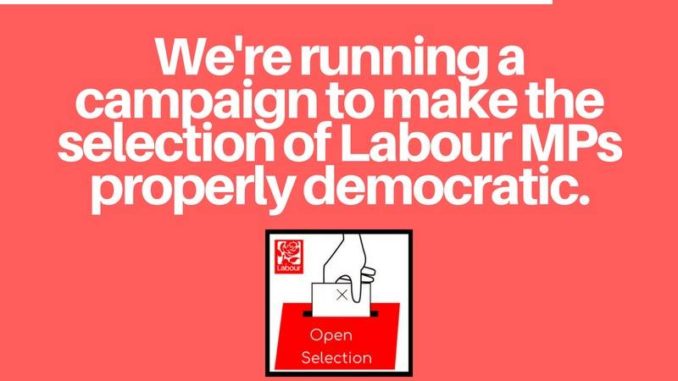
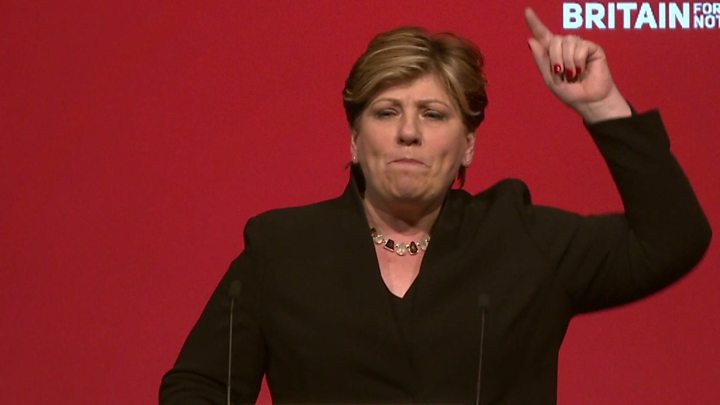
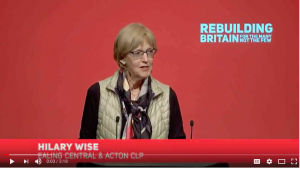 Wolfson was, however, less than “welcoming” when Hilary Wise from Ealing and Acton Central CLP spoke passionately about the anti-Semitism smear campaign (
Wolfson was, however, less than “welcoming” when Hilary Wise from Ealing and Acton Central CLP spoke passionately about the anti-Semitism smear campaign (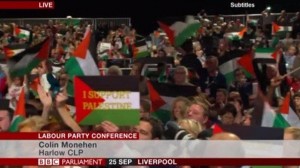 According to Asa Winstanley
According to Asa Winstanley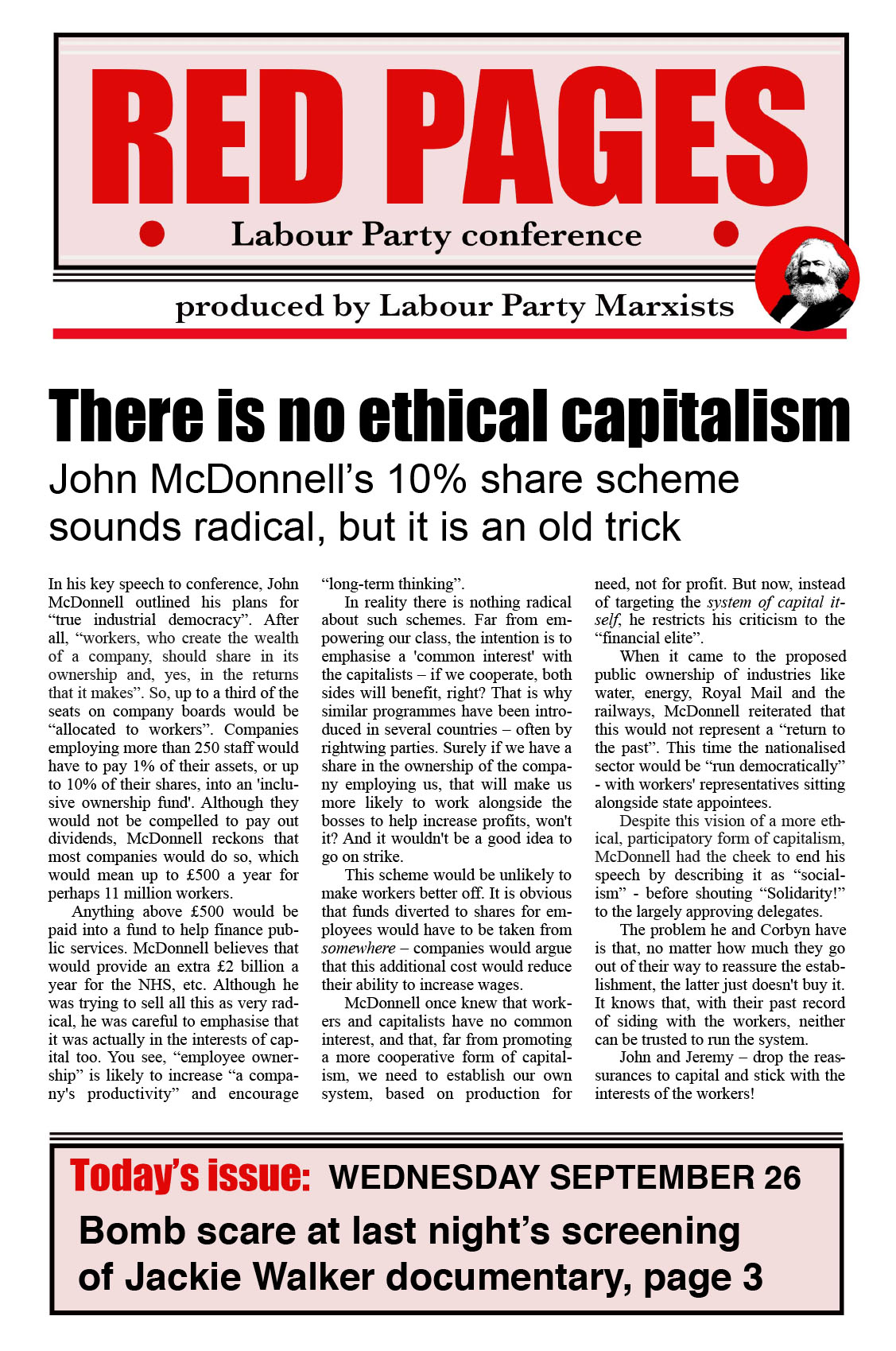
 Wednesday September 26 2018: Download
Wednesday September 26 2018: Download 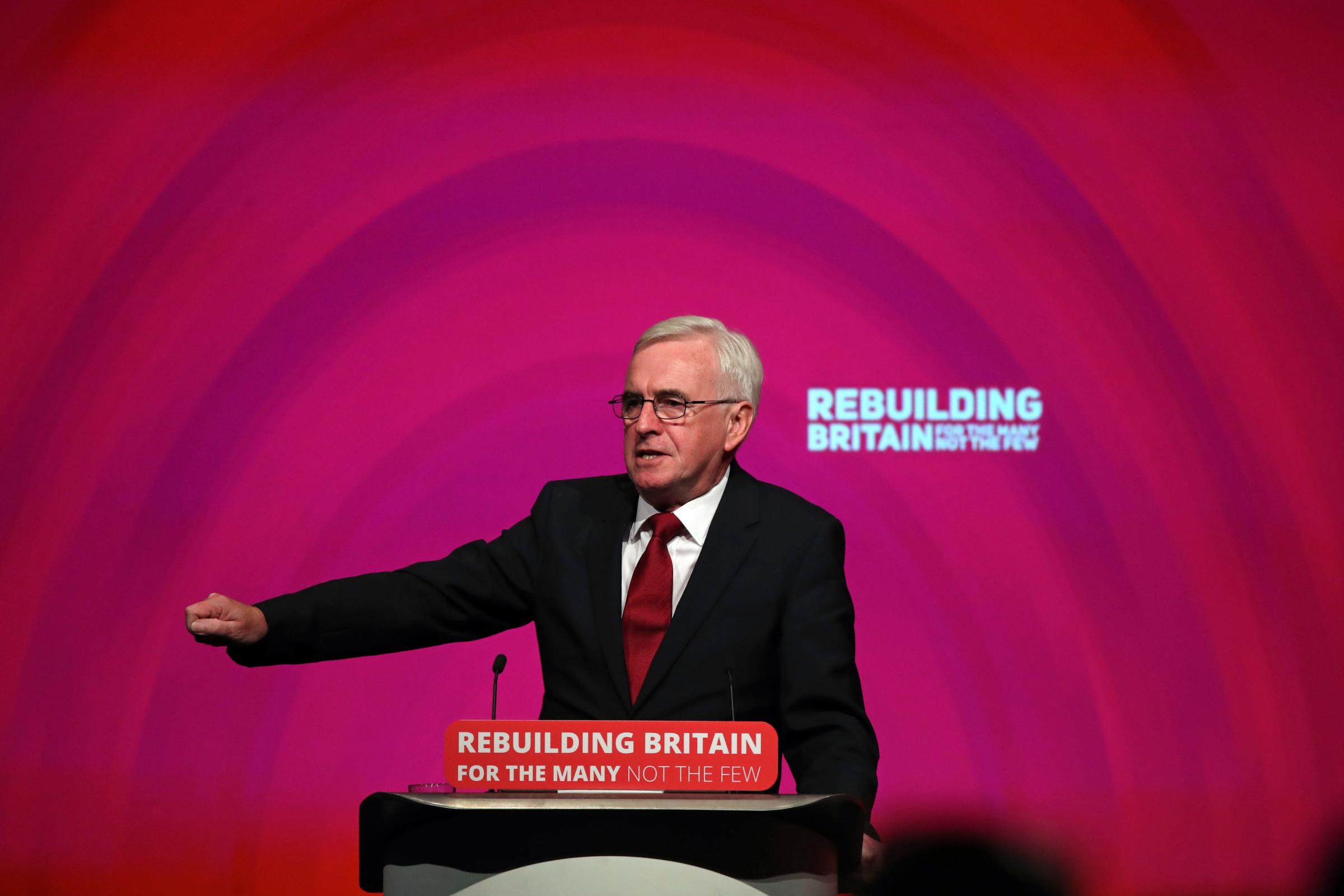
 In the end, none of it happened. Supporters of the pro-Zionist Jewish Labour Movement and other rightwingers kept to themselves and made no attempt to engage delegates and visitors. We also received markedly less abuse this year compared to the 2017 conference in Brighton. Last year, our Labour Party Marxists front-page article – ‘
In the end, none of it happened. Supporters of the pro-Zionist Jewish Labour Movement and other rightwingers kept to themselves and made no attempt to engage delegates and visitors. We also received markedly less abuse this year compared to the 2017 conference in Brighton. Last year, our Labour Party Marxists front-page article – ‘ We got a few quietly huffed comments along the lines of ‘Don’t you know that’s anti-Semitic?’ But that’s about it. While the right has been incredibly successful with their smear campaign in the mainstream media, that kind of bubble bursts pretty quickly once you come to con- ference. Party delegates are usually among the most active Labour members – they know from first-hand experience that the party is not riddled with anti-Semites. It seemed as though every other delegate or conference visitor had swapped their official lanyard (featuring the logo of the rightwing Usdaw union) with that handed out by the Palestine Solidarity Campaign.
We got a few quietly huffed comments along the lines of ‘Don’t you know that’s anti-Semitic?’ But that’s about it. While the right has been incredibly successful with their smear campaign in the mainstream media, that kind of bubble bursts pretty quickly once you come to con- ference. Party delegates are usually among the most active Labour members – they know from first-hand experience that the party is not riddled with anti-Semites. It seemed as though every other delegate or conference visitor had swapped their official lanyard (featuring the logo of the rightwing Usdaw union) with that handed out by the Palestine Solidarity Campaign. Clearly, the civil war is far from over and the smear campaign in the media continues unabated. For example, the right has been busy fingering comrade Machover and LPM: The Jewish Chronicle shouts that we were distributing “vicious anti-Israel hate material, Breitbart calls it an “inflammatory article”, while The Times of Israel complains, wrongly, that comrade Machover was “comparing Israel to Nazis”.
Clearly, the civil war is far from over and the smear campaign in the media continues unabated. For example, the right has been busy fingering comrade Machover and LPM: The Jewish Chronicle shouts that we were distributing “vicious anti-Israel hate material, Breitbart calls it an “inflammatory article”, while The Times of Israel complains, wrongly, that comrade Machover was “comparing Israel to Nazis”. Last night’s film preview of the new documentary, ‘The political
lynching of Jackie Walker’, had to be stopped a few minutes in.
After an anonymous phone call (“there are two bombs in the
building that will kill many people”), all 150 visitors had to evacu
ate Blackburn House on police orders. Of course, no bomb was
found. By the time the police gave the all-clear, the staff wanted
to go home. This hoax is almost certainly part of the campaign
by pro-Zionist forces to disrupt and intimidate the pro-Palestinian left. But, of course, this kind of cowardly behaviour will only
increase the feeling of solidarity for Jackie Walker and all the
other victims of the witch-hunt – and interest in the film. Director Jon Pullman announced outside Blackburn House that anybody who wants to show the documentary should contact him:
Last night’s film preview of the new documentary, ‘The political
lynching of Jackie Walker’, had to be stopped a few minutes in.
After an anonymous phone call (“there are two bombs in the
building that will kill many people”), all 150 visitors had to evacu
ate Blackburn House on police orders. Of course, no bomb was
found. By the time the police gave the all-clear, the staff wanted
to go home. This hoax is almost certainly part of the campaign
by pro-Zionist forces to disrupt and intimidate the pro-Palestinian left. But, of course, this kind of cowardly behaviour will only
increase the feeling of solidarity for Jackie Walker and all the
other victims of the witch-hunt – and interest in the film. Director Jon Pullman announced outside Blackburn House that anybody who wants to show the documentary should contact him: 
